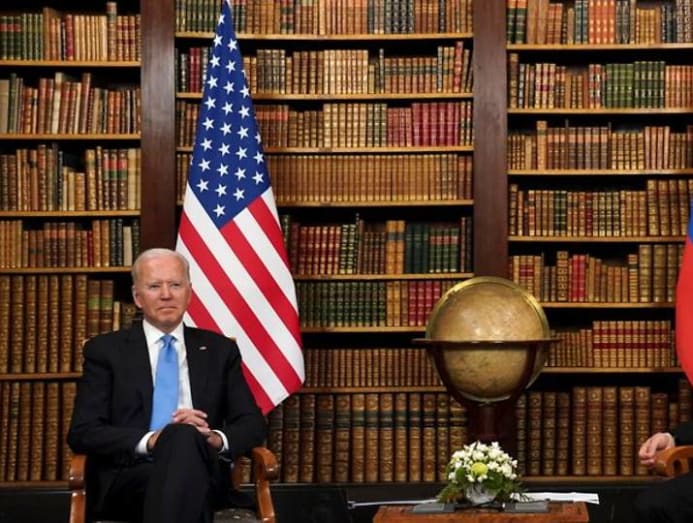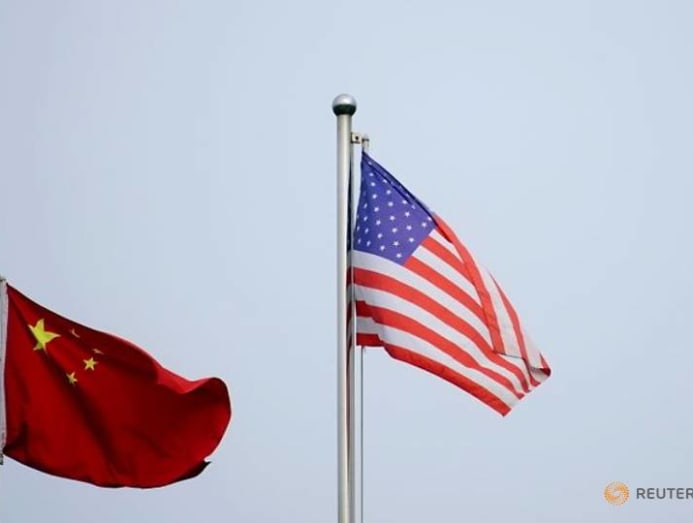Commentary: US must give up on containing China when accommodation is unavoidable
HONG KONG: In their latest communiqué, NATO leaders declared that Cathay presents "systemic challenges to the rules-based international lodge".
The response from China's mission to the European Union was clear:
Nosotros will not present a 'systemic claiming' to anyone, but if someone wants to pose a 'systemic challenge' to us, we will not remain indifferent.
Such a tit-for-tat rhetoric is unnecessary, and virtually of the earth's population probably does not want it to escalate. However escalation is becoming more likely every twenty-four hours.
READ: Commentary: Why the West has issues defining a clear China policy
FIGHTING WHEN NECESSARY?
That is largely because China is one of the few policy areas where United states President Joe Biden has largely upheld the approach of his predecessor, Donald Trump: Compete fiercely, cooperate when needed, and confront when necessary.
And so, equally Communist china's response to the NATO communiqué implies, it has adopted its own three-pronged response: Don't look for a fight, don't be afraid to fight, and fight when necessary.
NATO is hardly the only forum where Biden is pushing the The states approach. At the recent G7 summit and during his meeting with EU leaders, Biden besides sought to convince America'south allies to form a united front against Prc (and Russia).

Usa Senator Bernie Sanders sees the problem. He recently warned that, by casting China as an existential threat, the US political establishment is finer "beating the drums" for a new cold war, which will have no winner. Equally he put information technology, organising United states of america foreign policy around a "zero-sum global confrontation with China" would be "politically dangerous and strategically counterproductive."
FLAWED Approach TO Cathay
America's flawed approach to Mainland china is rooted in an enduring conventionalities in the concept of absolute national security. Merely, while this might have been a reasonable goal for the United States in the decades after World State of war Ii, when the state stood at the helm of a unipolar world social club, it is not realistic in today's multipolar arrangement.
In today's world, attempting to "contain and confront" those with different values or systems, rather than negotiating a new global compact that accommodates them, is a recipe for conflict.
Information technology certainly impedes the ability to pursue mutually beneficial economical engagement and cooperation on shared challenges like climate modify. Equally a spokesperson for the Chinese embassy in London noted after the G7 summit: "The days when global decisions were dictated by a small group of countries are long gone."
Merely the trouble runs deeper: Fifty-fifty inside this "small group of countries," decisions like courting conflict with Prc exercise not necessarily reverberate the will of the majority. As Joseph E Stiglitz has argued, the US today looks more like a plutocracy – with the acme ane per cent of income earners able to steer most public policy in their favour – than a representative democracy.
If the summit 1 per cent in a land that accounts for 5 per cent of the earth'southward population pushes the 2 largest economies into conflict, the unabridged world will suffer immensely, with the vast bulk of people getting no say in the matter.
If the US and its Western allies genuinely believe in commonwealth, they should find this unacceptable.
MOVING BEYOND NATIONAL SECURITY
A ameliorate approach – and ane that reflects the values Western liberal democracies claim to concord dear – would business relationship for the interests of "One Globe," encompassing all of humanity and the planet on which we depend.
That means expanding our perspective beyond national security to pursue global security – the greatest good for the greatest number – and ensuring that every man beingness has a say in determining our commonage future.
READ: Commentary: Why the Wuhan lab-leak theory is back despite lack of new bear witness
READ: Commentary: Some soul-searching needed in Red china'due south fresh push button to make friends and influence people
We are not arguing for global government. The natural and social sciences have shown the fragility of monoculture. In human civilization, as in nature, diversity brings stability and progress.
Even competition can be a practiced affair, but merely if it is balanced past effective cooperation, and violence, confronting humans or the environs, is eschewed.
MOVING BEYOND 'A CLASH OF CIVILISATIONS'
Then, how would a 1 Globe system be realised? Lesser-upwards feedback mechanisms, enabled by technology, will be crucial.
The objective must be to break the silos that global elites, aided by abstract linguistic communication, have traditionally created. This would enable more people – with expertise in more areas – to contribute to discussions.

The benefits of such an approach are thrown into relief by the tension betwixt traditional economic thinking – focused on ever-more than consumption, investment, and growth – and environmental imperatives, like reducing greenhouse-gas emissions and protecting biodiversity. In a One Globe organisation, more of a "adept thing" tin often be very bad.
READ: Commentary: Did the world just go a second Chugalug and Road Initiative?
The obsolete, siloed approach is likewise reflected in the facile narrative that the US and China are locked in a "clash of civilizations." Empires clash. Civilizations should exist "civil" to one another, not least considering we are all sharing the same Earth.
To that end, leaders must move beyond a narrow focus on national security to broad, inclusive discussions virtually how to deliver global security, in the course of peace, stability, acceptable nutrition, and environmental sustainability.
But, first, the US must surrender on containing China and first accommodating it.
Andrew Sheng is Distinguished Fellow at the Asia Global Institute at the University of Hong Kong and a member of the UNEP Informational Council on Sustainable Finance. Xiao Geng, Chairman of the Hong Kong Institution for International Finance, is a professor and Director of the Research Establish of Maritime Silk-Road at Peking University HSBC Business School.
Source: https://cnalifestyle.channelnewsasia.com/commentary/commentary-us-must-give-containing-china-when-accommodation-unavoidable-295891
0 Response to "Commentary: US must give up on containing China when accommodation is unavoidable"
Postar um comentário